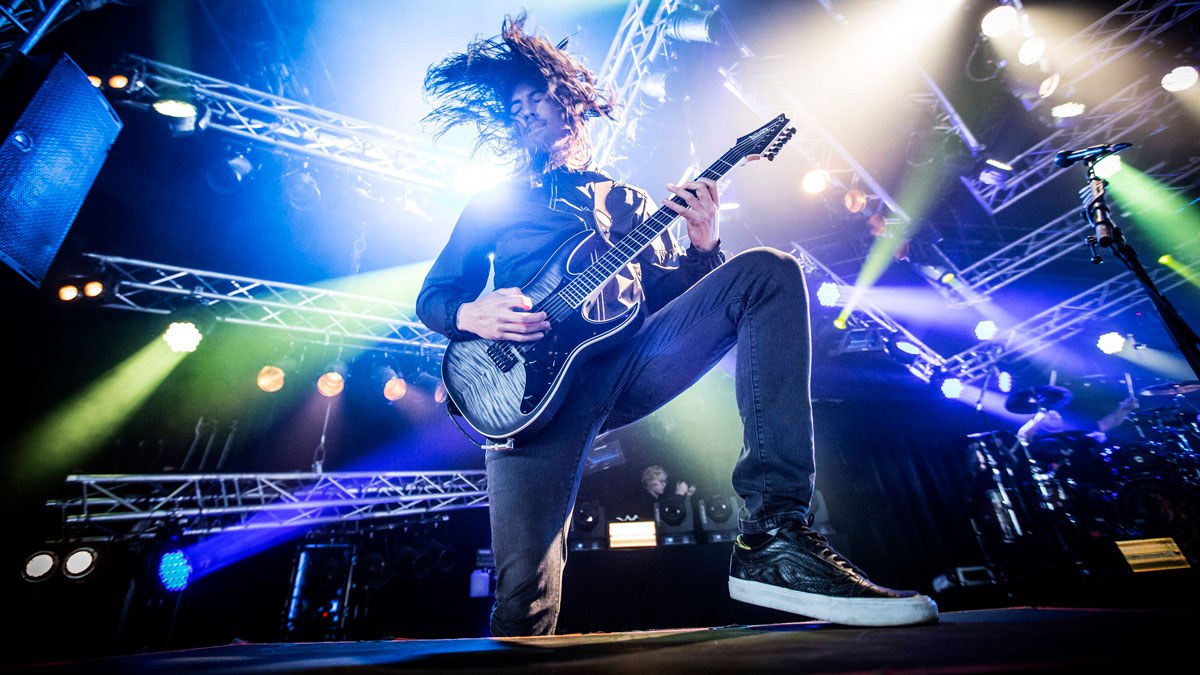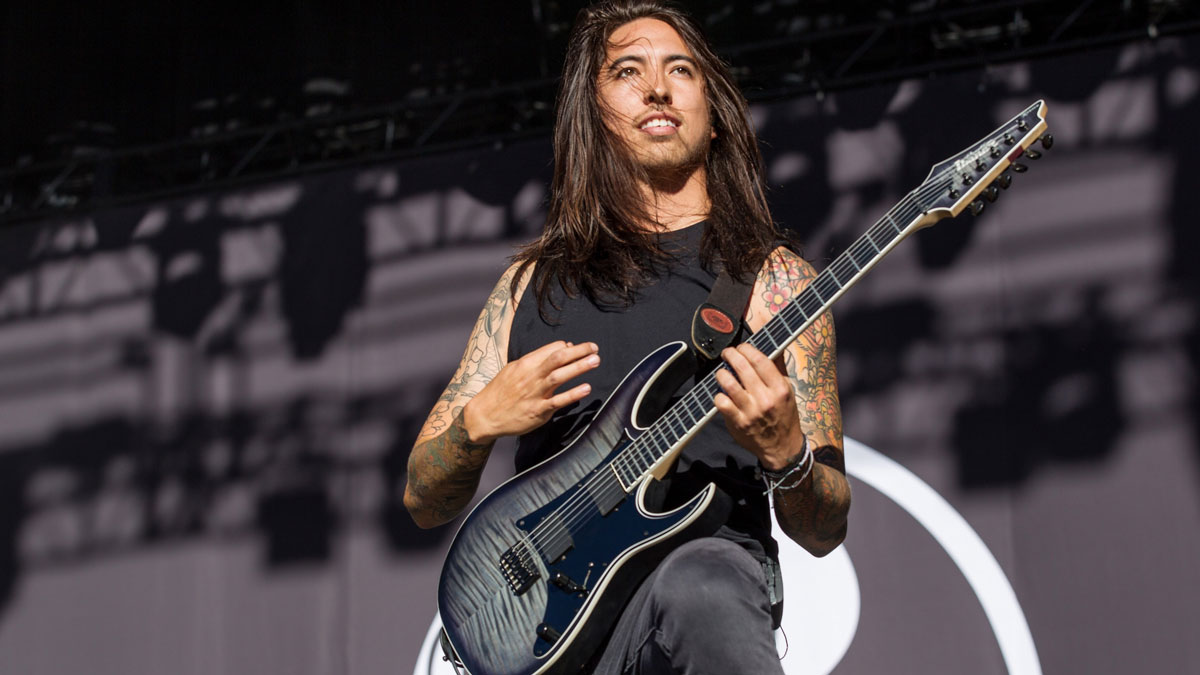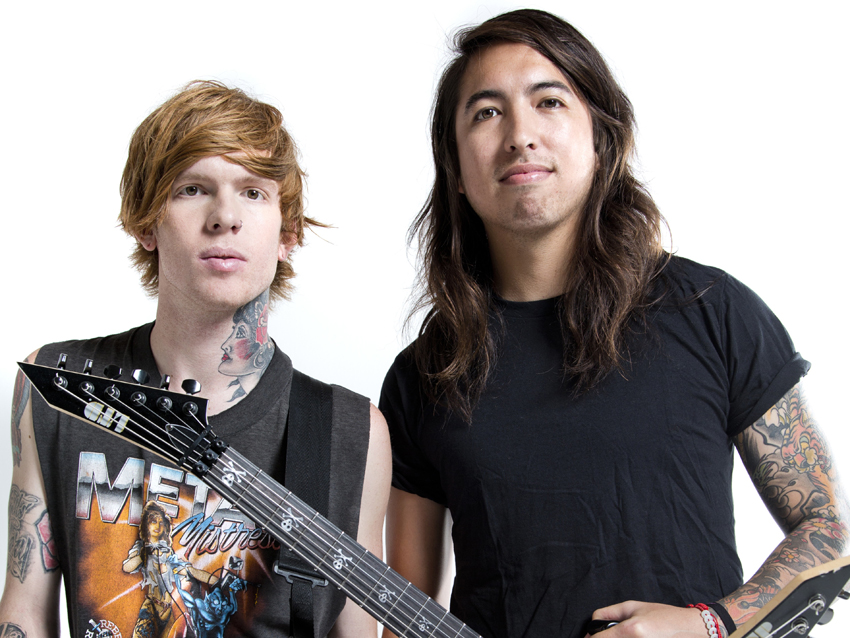Of Mice & Men’s Phil Manansala: "I never realised the similarities between pop songwriting methods and our music - I just wrote breakdowns and sick riffs!"
Metalcore mainstay talks analysing Britney with Linkin Park, Austin Carlile's departure and why OMAM have just had their best year yet

Since forming in 2009, Orange County’s Of Mice & Men have become one of the most successful metal bands of a new generation.
At the heart of their noise, guitarists Phil Manansala and Alan Ashby – the latter of whom joined a few years into the band – have become a tag-team in heaviness, getting to the point where they can now read each other in musical situations with an almost telepathic synergy.
They’ve endured all the highs – from supporting Linkin Park and Slipknot on the biggest metal tours of the modern age – and taken a few knocks along the way, most notably in the aftermath of original frontman Austin Carlile’s exit in 2016.
Here, Manansala cross-examines their musical chemistry, explaining how MusicRadar readers can follow a similar path, while offering his thoughts on the band’s rebirth one man down…
You and Alan have now been playing together for seven years. What do you feel is the key to that dynamic?
“We never really judge each other on what we do. Instead, we let every idea flow out until we have to start making executive decisions on the songs. That’s when we will start critiquing each of the parts.
When it comes to writing, we both do whatever we feel like. We never really get too judgemental because writing can be quite a sensitive situation
“When it comes to writing, we both do whatever we feel like. We never really get too judgemental because writing can be quite a sensitive situation; music can be very personal and have a lot of meaning… which can make it harder to talk about.
Want all the hottest music and gear news, reviews, deals, features and more, direct to your inbox? Sign up here.
“Luckily, the two of us have been together writing for a good while now and we have that dynamic – we know what we both do and what it takes to make the best OMAM songs possible.
“Aaron [Pauley, vocals/bass] and Valentino [Arteaga, drums] also help with writing guitars… it’s a full team effort. It’s not like we’ll ignore Valentino’s riff just because he plays drums - that would be stupid. In a band, you should utilise everything at your disposal.”
And what do you see as each other’s biggest weaknesses?
“My soloing could definitely be better! My theory could be a lot stronger, too, just knowing where to go on the fretboard. I do know some scales, but it’s the full knowing of where to go and why that I need to work on. I know enough, but I really wish I had more of a blues/jazz background. My upbringing was full of more punk-rock stuff… I can play a ton of Blink-182 songs, though, haha!
“With Alan, I would say his weakest part is his brain… just kidding! He’s a pretty well-rounded guitar player. I guess his metal soloing could be better, because he’s a more of a blues player – a lot of it ends up sounding similar just in a different key. Once you’re a blues player, you tend to you use the same scale all over the guitar.
“Neither of us are shredders, though; I wish we could sweep through arpeggios all over the fretboard like Herman Li or wail away like Kirk Hammett – and be a bit more free with our playing.”
Speaking of freedom, there are pop elements integrated into your wall of noise. How do you go about integrating different styles together?
Back when we wrote Restoring Force, we got the chance to work a bit with Linkin Park’s Mike Shinoda. He showed us his theory of how to break down a Britney Spears song
“Back when we wrote Restoring Force, we got the chance to work a bit with [Linkin Park’s] Mike Shinoda. He showed us his theory of how to break down a Britney Spears song – going from the intro, verse, chorus or pre-chorus, bridge, chorus, outro, etc. He showed us that pop songs followed a simple format. Listening to a lot of pop music myself, like Britney, NSYNC, Backstreet Boys… the list goes on; I never realised the similarities between those songwriting methods and our music.
“I kinda just wrote breakdowns and sick riffs, thinking about what the crowd would be doing – not even understanding that I was still following a format. We were blindsided by all of that until Mike showed us more. On our first album, there are a couple of songs that follow a pop format, but we probably weren’t aware of it.
“On our last album, Defy, we tried to write a couple of songs that didn’t follow the format… which is a lot harder to do! It felt weird – breaking the mould is difficult. When you’re young and writing music, you don’t really think about that stuff, but as you get older more and more thinking comes into it.
“When Aaron came into the band on Restoring Force, that also dramatically changed our perspective on writing, as did working with [producer] David Bendeth.”
Original singer Austin Carlile left the band in 2016 due to health complications. How much has the line-up change affected your role as a guitarist?
“This band have always written the music together. Not discounting Austin’s input, but we were the instrument players coming up with a lot of the ideas. On Restoring Force, there were a couple of songs where Austin didn’t want to take the lead and Aaron did, filling the space a lot better. There was the song Would You Still Be There, which ended up being one of our biggest songs.
“Any band that loses their frontman will feel like they’ve lost one of their most influential members – maybe not musically in our case, but definitely with the fans. Austin had a great relationship with our fans and he still does, so as a member of the band continuing on, of course it felt like we took a hit. It was very overwhelming when that all happened, seeing fans talking about it.
It’s been over a year now as a four-piece. I’m not afraid to say it’s been our best year as a band
“So we went back to the studio and picked up our instruments wondering what we were going to do next. Aaron just started doing all the vocals and we all agreed after three songs, we would be dumb to stop playing music because we lost Austin.
“It was a big hit, but we were always the core of the band, writing most of the music. I think especially with Aaron as a vital songwriting member, it felt a lot easier on Defy for him to do the vocals – it made sense melodically and vocally for him to write it all out.”
Did you ever consider getting a replacement frontman?
“To have someone fill Austin’s shoes would have been impossible. Every fan would have preferred to hate us than try to enjoy our new music with some new screamer in the new line-up. Keeping it just the four of us and knowing we would do it ourselves, we felt like we were standing in defiance, against all the odds.
“It’s been a wild rollercoaster: we played our first show on April 21 last year – so it’s been over a year now as a four-piece. I’m not afraid to say it’s been our best year as a band. Sure, we’ve toured with Linkin Park and Slipknot, but now I feel like we are playing to a new crowd every night, having to re-prove who we are as a band. We’re still here doing it!”
That Linkin Park tour was a big moment for OMAM. Being one of the quieter members of the nu-metal heroes, did you get the chance to learn much from [guitarist] Brad Delson?
“He was very quiet – that’s him to a tee! But he’s not stand-offish; I think he just likes chilling alone, but there were a couple of times on that tour where he came out of his way to hang out with Alan and I.
“The main thing I picked up from him was from his live performances: he makes it look so easy – almost as if he wasn’t even playing the song! You’d have to look at his hands just to know for sure! And actually, he doesn’t use in-ears… everyone else in the band does, but he doesn’t - despite wearing those over-ears he wears. His timing must be impeccable - he’s not on that click yet able to come in perfectly on time with everything. That’s really quite impressive.
“His stage presence is awesome, too; he knows what he’s doing up there. We only hung out a few times and he came across very quirky yet also quite shy. His riffs are some of the most simple metal riffs of all-time, but also some of the catchiest. He was definitely doing something right on Hybrid Theory and all the albums since. Getting to see that rig every day was definitely mind-blowing.”

If you could have a lesson with any other guitarist alive right now, who would you pick?
“I’d have to say John Mayer because he’s such an amazing character and terrific player. Man, it’s such a hard question to answer because there’s Tom Morello, Wes Borland… all these amazing musicians, but I think John Mayer would be the one for me.
“He’s like the incarnation of five guitar players in one. There are probably 50 players out there I wish I could get a lesson from. The fact that I’m even friends with a few of them like Tosin Abasi is pretty crazy. A lot of the players in the tech world are just ridiculous.”
Is there any new gear that’s been blowing your mind over the last year or so?
I signed with Hughes & Kettner, and now I’m using a TriAmp Mark 3 with my Axe-Fx for my effects. That amp is a limitless machine - it’s almost like an Axe-Fx but in a real amp form
“I’m still playing Ibanez… I just got this new custom guitar which is beautiful. Since I last spoke to MusicRadar, I signed with Hughes & Kettner, and now I’m using a TriAmp Mark 3 with my Axe-Fx for my effects. That amp is a limitless machine - it’s almost like an Axe-Fx but in a real amp form.
“You can change power tubes while it’s on! If I want EL34s or 6L6s, I can choose and have a lot of power. There’s so much low-end weight to my tone. It’s everything I’ve ever wanted out of a head. Alan is using the same as before – an ESP going into an Axe-Fx.”
Playing with that much high-gain presents its own challenges. How do you go about controlling all that distortion?
“I think practising is very important. It sounds cliché, but you need to do it as much as you possibly can. When I was younger, I would be headbanging and going crazy in my parent’s garage. I never thought I’d be doing it on stage, as funny as it sounds… but that’s where I honed it all in. Just like a soccer or basketball player, you get the pass and have one shot to make it or miss it. Maybe headbanging in my parent’s garage isn’t as drastic as that, but it’s the same kinda idea.
It’s important to find people that will sacrifice their lives to play music with you – that’s almost the hardest thing about starting a band
“It’s important to find people that will sacrifice their lives to play music with you – that’s almost the hardest thing about starting a band. It takes people to make a band work; you need to step out onto that stage together as a unit. I wouldn’t be anywhere without the people around me – we all push each other.
“When we mess up, we make sure that same mistake never happens again. You have to take it seriously, always practising and playing to a click. Everything is always to the exact same BPM and you end up becoming a bit more robotic, which is good for consistency. You want it to sound like it does on the albums.”
What’s been your biggest revelation over the years as a guitarist?
“I had no idea when I was younger that there was any tuning other than drop D. I would wonder how Korn and Slipknot were getting all these low tones and ended up dropping down to B or A. I always used to down-pick as well - I didn’t really know how to alternate-pick until I got into Metallica and the other heavier bands after starting out with Blink-182.
“That picking technique turned out to be very crucial – knowing which strings to pluck at the correct time, controlling everything with your index finger or pinky. You have to mute strings around the ones you are playing.”
Finally, it’s early days yet, but how do you see OMAM evolving on the next album?
“We’ve been so inspired playing all these metal festivals. I’d love some more heavy breakdowns and triplets in that Lamb Of God style. The more metal a band are, the crazier the crowd get! We have our own take on heavy, of course… but one of my favourite bands growing up was As I Lay Dying. That’s why I started playing metalcore.
“But now I’d like to go a bit more down the straight metal route, with more solos and stuff like that. We haven’t really dipped into it that much yet. It’ll be interesting to see how crazy the circle-pits get if we head that way!”
Amit has been writing for titles like Total Guitar, MusicRadar and Guitar World for over a decade and counts Richie Kotzen, Guthrie Govan and Jeff Beck among his primary influences. He's interviewed everyone from Ozzy Osbourne and Lemmy to Slash and Jimmy Page, and once even traded solos with a member of Slayer on a track released internationally. As a session guitarist, he's played alongside members of Judas Priest and Uriah Heep in London ensemble Metalworks, as well as handling lead guitars for legends like Glen Matlock (Sex Pistols, The Faces) and Stu Hamm (Steve Vai, Joe Satriani, G3).

